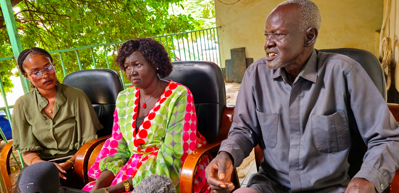As South Sudan reels from the fierce gang rape of a teenage girl in Juba’s Sherikat suburb, community elders are raising an alarm over escalating youth-related insecurity in the capital.
Bol Manyang, an elder from the Duk Community in Juba, has made a plea to the government, urging urgent action to curb gang violence to reclaim the future of South Sudanese youth.
Speaking at a press event organized by women’s rights and civil society organizations, Manyang said parents are overwhelmed as children are increasingly engaging in violence, crime, and drug abuse, often in full view of security personnel.
“Why are our children defeating us as parents?” he asked, adding: “We elders dreamt of raising children who would build this country, now they are out of control, killing, robbing, joining gangs, and the government is just watching.”
The elder criticized law enforcement personnel for failing to arrest known gang members, despite their whereabouts being widely known. He called for laws that protect children from falling into criminal activity, regardless of their background.
“Whether they are orphans or not, their future must not be destroyed,” Manyang stated. “The streets of Juba are full of boys who have dropped out of school, joined gangs, and turned against the very society that raised them.”
He added that elders are willing to cooperate with the government to report gang-related activities carried out by errant youths commonly referred as “niggers” or “crews” but face challenges, including police officers demanding money to file reports.
“Reporting crimes should not come with a price tag. Where are we supposed to get the money?” he said. “The future of our country is being destroyed before our eyes. We need laws. We need discipline. We need leadership.”
He concluded with a call for national reflection and collective responsibility from both government officials and parents.
Relatedly, women leaders across South Sudan are demanding swift justice and national reforms following the gang rape of a 16-year-old girl in Juba’s Sherikat neighborhood. The incident, widely condemned as a national crisis, has reignited calls to address youth delinquency, gender-based violence, and systemic impunity.
At a press conference held Monday at the Central Equatoria Women’s Union in Hai Neem, the Women’s Bloc of South Sudan, joined by the Office of the First Lady, Concern for Women and Children, and other civil society organizations, issued a joint communique demanding accountability.
“This is not just an attack on one girl or one family,” said Amer Manyok Deng Yap, Chairperson of the Women’s Bloc and Deputy Chairperson of IGAD Women, Peace and Security. “It is an assault on our collective dignity and humanity,” she stated. “We need justice for the girl who was raped—and we need it now.”
The assault, which happened on 19 June, was recorded and circulated online on social media and showed a group of young men forcing the girl into sexual acts. The footage triggered widespread outrage, prompting police to arrest seven suspects who are now under investigation.
Amer warned that the case reflects a broader societal breakdown.
“Our sons are forming gangs, abusing drugs, riding unlicensed motorbikes, and committing rape, abduction, and theft,” she said. “Meanwhile, our daughters are striving in school, in church, in markets. Where are the fathers, brothers, and leaders to organize the boys?”
She called on national security agencies, the police, CID, and military intelligence to urgently intervene and investigate the root causes of youth violence, including poverty, lack of education, and the proliferation of weapons.
The Women’s Bloc is also urging amendments to South Sudan’s 2008 Penal Code to impose harsher penalties for sexual violence and ensure swift justice for survivors.
“Let this press conference not be a moment, but a movement,” Amer declared. “No more rape. No more silence. No more shame.”
Meanwhile, Akur Leek Aleer, a human rights defender, described the climate of fear many women and girls now live in. “We are scared,” she lamented. “After the Sherikat rape case, there were more attacks—robberies, assaults, rapes. People no longer walk freely in their neighborhoods.”
She urged the youth to use their voices to demand change.
“Talk on social media, speak in schools and homes,” Leek urged. The more we speak, the more those in power will have to listen.”
As the country awaits judicial action in the Shirikat case, South Sudanese women and community elders are vowing to sustain public pressure for justice—and for long-overdue reform.




